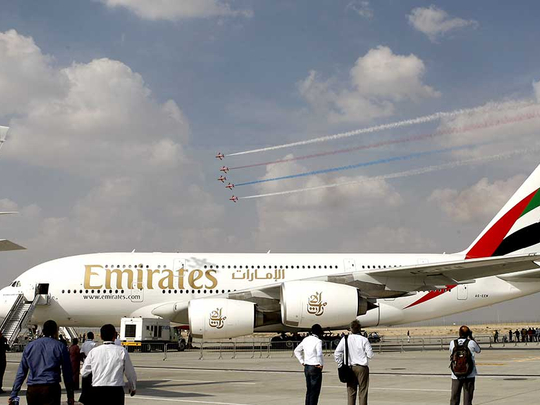
Dubai: Airbus said on Monday it would have “no choice” but to stop producing the A380s if it does not work out a deal with Emirates airline, the aircraft’s main customer.
Airbus’s top executives said during a conference call the company is still in talks with Emirates about a possible A380 order, and that Airbus is “hopeful” a deal will be finalised.
“Quite honestly, if we can’t work out a deal with Emirates, I think there is no choice but to shut down the programme, but I’m hopeful that we’ll work out a deal with Emirates, and others can add airplanes on top of that,” said John Leahy, chief operating officer and sales chief at Airbus.
“We’re still talking to Emirates, but quite honestly, they’re probably the only one [with] the ability right now in the market place to take a minimum of six [A380 aircraft] a year for a period of eight to 10 years, and then we can add some on top of that,” he said.
Airbus and Emirates failed to reach a deal for new A380s during the Dubai Air Show in November as Emirates demanded more assurance from the aircraft manufacturer on the future of the A380 programme.
At the Air Show, Emirates ordered 40 Boeing 787 aircraft instead, with Tim Clark, president of Emirates airline, throwing the ball in Airbus’ court and saying a deal “is very much down to them.”
“I think the ownership here are concerned about continuation [of the A380]. They need some copper-bottom guarantees that if we do buy some more, then the line will be continued for a minimum period of years and that they are fully aware of the consequences of cancellation and leaving us high and dry,” Clark told Reuters in November.
He said a reasonable commitment from Airbus would be to keep the A380 line going for a minimum of 10 years.
Fabrice Bregier, president of Airbus commercial aircraft, said during the call with reporters that there are other potential customers for the A380s besides Emirates, but that “it is clear that Emirates is key for the long-term future of this programme.”
When contacted by Gulf News, Emirates did not comment on the issue.
On Monday, Bregier also said that Airbus will deliver 12 A380s in 2018, and 8 of the model in 2019. He said Airbus would need a minimum of six A380 aircraft a year to maintain an efficient production line — a challenge that he believes can be met.
The comments came during a call to discuss Airbus’s commercial aircraft deliveries in 2017, with the aircraft manufacturer announcing it delivered 718 aircraft to 85 customers. The figure puts deliveries for the year more than 4 per cent higher than the 688 delivered in 2016.
Airbus also saw 1,109 net orders from 44 customers, putting the company’s backlog at the end of 2017 at 7,265 aircraft valued at over $1 trillion.
The figures place Airbus ahead of rival Boeing, which last week said it had a backlog of 912 net orders valued at $134.8 billion. Boeing, however, delivered more aircraft than Airbus in 2017, with 763 deliveries.
During the call, Airbus said it expects to continue to have good sales on its wide-body aircraft, and is currently in the middle of three wide-body deals that it hopes to sign within the next 30-60 days.
Discussing the Middle Eastern market specifically and outlook, Leahy said it remained a “strong market.”
“It’s no secret that oil prices are moving back up again... The economies tend to be on the mend, airlines are doing better, as they are around the world, so we see a lot of potential in the Middle East, and not just for A380s,” he said.












